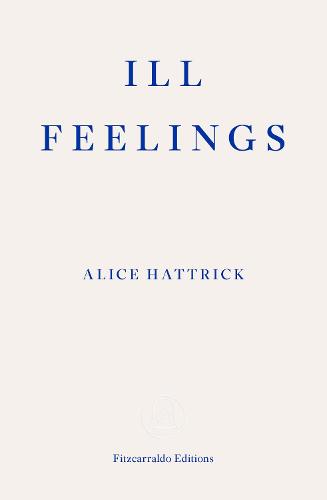Ill Feelings

Ill Feelings blends memoir, medical history, biography and literary non-fiction to uncover untold case histories of medically unexplained and invisible illness. In 1995 Alice’s mother collapsed with pneumonia. Her lungs were infected, which caused flu-like symptoms: fatigue, headache, chest pain, fever. She never fully recovered and was eventually diagnosed with ME, or Chronic Fatigue Syndrome. Then Alice got ill. Their symptoms mirrored their mother’s and appeared to have no physical cause; they received the same diagnosis a few years later. Since this time, neither of them have been well, even if, at times, they believed they were well-enough.
Structured around the narrative of the author and their mother’s own ill feelings, Alice Hattrick’s collective biography of illness branches out into the records of ill health women have written about in diaries and letters. Their cast of characters includes Virginia Woolf and Alice James, the poets Elizabeth Barrett Browning and Emily Dickinson, Ruskin’s lost love Rose la Touche, and the artist Louise Bourgeois. Ill Feelings is a moving and defiant debut from a bold new voice in narrative non-fiction which inhabits a similar space to Leslie Jamison’s The Empathy Exams and Emilie Pine’s Notes to Self, but has a texture and voice – a generative, transcendent rage – of its own.
‘Ill Feelings offers spellbinding reality unlike anything I have ever read. It conquers the sense of grief that we have to learn to live with; this deep guttural fear in humanity is addressed compassionately.’ –― Billie Ingram Sofokleou, Buzz Magazine
‘Hattrick’s ability to reflect life with ME in form and language is complex and brilliant. The structure of Ill Feelings appears initially as haphazard, perhaps, but the more you read, the more it clarifies: this is not a book of simple narrative, of gradual progression. The chapters shift around in both tone and environment. While the spine of the story is Alice’s ― their various treatments ranging from the comforting to the absurd, and their relationship with their mother ― there are many branches and loops throughout the book…while Hattrick does not use a normative plot structure, while they do not stick to one manifestation, there is a clear message: when we define another as ‘disabled’, we are discounting their life and their applicability to what we call progress…Capitalism is closing the borders of language around us, and in so doing, is narrowing the human experience down to a sharp, ableist point.’ –― Connor Harrison, Review 31
